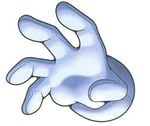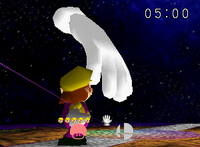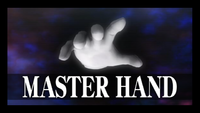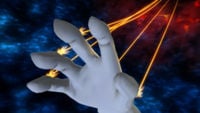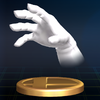Master Hand
This is an article about the hand from Super Smash Bros. Brawl. For information about the pointing hands from New Super Mario Bros., see here. For information about the wave-like arms from Super Paper Mario, see Underhand. For other uses of "Master", see Master. Template:SSB Infobox Master Hand is one of the main antagonists of the Super Smash Bros. series. Master Hand is a large, disembodied, right glove who appears in every Super Smash Bros. game.
Master Hand is voiced by Jeff Manning in the original, Dean Harrington in Super Smash Bros. Melee, and Pat Cashman in Super Smash Bros. Brawl, who also voiced the announcer of that respective game.
History
- Main article: SmashWiki:Master Hand
Super Smash Bros.
Master Hand first appears in Super Smash Bros., where he supposedly uses his imagination to give his playset of Nintendo characters life and pits them against each other. After a character defeats all challengers, he or she is transported to a battlefield known as "Final Destination", where he or she battles against Master Hand. After defeating the being, players revert to their doll state, because without Master Hand's imagination, the characters are lifeless dolls.
Super Smash Bros. Melee
Master Hand reappears in the sequel to Super Smash Bros., Super Smash Bros. Melee. This game introduces Master Hand's counterpart, Crazy Hand, which is said to embody a lust for destruction (the game also says that Master Hand embodies creation). The battle against the Master Hand in this game is nearly identical to that of the original Super Smash Bros.; after defeating all opposition, the player faces Master Hand in Final Destination. The only difference is that if the player clears all stages on the normal difficulty or higher within 10 minutes and without using a continue, Crazy Hand appears once Master Hand has lost half of his HP; as in the original, once Master Hand (and sometimes Crazy Hand) is defeated, the player reverts into a trophy, appearing among the trophies of others who have defeated the Master Hand.
The Master Hand is a much more difficult enemy in Melee because his health increases as the difficulty increases, and the timer can't be turned off in single player anymore (if the timer runs out, then the player automatically loses regardless of health or number of lives).
On very hard difficulty, Master Hand's Drill, Jet, and Grab (up throw) is a One-hit KO.
In this game, there is also a glitch to play as Master Hand; see here.
On a side note, based on his trophy, Master Hand is considered to be genderless in this game.
Super Smash Bros. Brawl
Master Hand is featured in Super Smash Bros. Brawl. Though he is never actually fought in the Subspace Emissary, he appears in Boss Battles Mode with the standard Emissary boss health bar. He also appears in his usual role as the last enemy faced in Classic Mode. Crazy Hand joins him under the same circumstances as in Melee; however, unlike in Melee, Crazy Hand appears immediately at the start of the battle.
In the Subspace Emissary storyline, Master Hand makes his debut as the leader of the Subspace Army, commanding his loyal minions, Ganondorf, Bowser, and Wario. However, near the end, it is discovered that Master Hand is being controlled by Tabuu via the chains of light in order to trick Ganondorf, Bowser, and Wario into drawing the entire world into Subspace. Angered, Ganondorf attempts to attack Tabuu, but he is blocked by a force field and turned into a trophy upon smashing into Master Hand. This severs the chains holding Master Hand, which tries to fight Tabuu but is knocked to the ground by the force field, where he lies unconscious for the remainder of the mode. When Master Hand is knocked out, he does not turn into a trophy as everyone else does.
Of the three minions that work for Master Hand, only Bowser is truly loyal to him; Bowser is heavily troubled when he sees Master Hand motionless. Ganondorf plans on betraying Master Hand, while Wario only does the work for his own amusement.
Stamina
- Super Smash Bros.
- 300 HP (All skill levels)
- Super Smash Bros. Melee
- 150 HP (Very Easy)
- 250 HP (Easy)
- 300 HP (Normal)
- 330 HP (Hard)
- 360 HP (Very Hard)
- Super Smash Bros. Brawl
- 150 HP (Easy)
- 250 HP (Normal)
- 300 HP (Hard)
- 330 HP (Very Hard)
- 360 HP (Intense)
Trophy Information
Melee
| # | Name | Image | First Game / Move | Description |
|---|---|---|---|---|
| 83 | Master Hand | Super Smash Bros. 04/99 |
The Master Hand awaits anyone who survives the long and difficult road to the Final Destination. This symbolic link between the real world and the imaginary battlefields of Super Smash Bros. Melee is quite a handful in battle, and just because it wears a white glove doesn't mean it fights clean. Get ready to be flicked, swatted, punched, and poked like crazy! |
Brawl
| # | Name | Image | First Game / Move | Description |
|---|---|---|---|---|
| 130 | Master Hand | N64 Super Smash Bros. WII Super Smash Bros. Brawl |
A being tied to the link between this world, where trophies fight, and the world beyond. The meaning of his existence is unknown, as are his goals, but he seems to have obtained (and kept hidden) a power that borders on absolute. He also seems to feel a certain joy in challenging chosen warriors who've claimed many victories. He waits even now in Final Destination. |
Names in other languages
Trivia
- In Kirby & the Amazing Mirror, Master Hand will become a recurring boss throughout the game. Once defeated, Kirby can eat it and become Smash Kirby (He can use all of Kirby's special attacks from Super Smash Bros. Melee). Master Hand also appears later in the game as a boss alongside Crazy Hand, Master Hand's left counterpart.
| Super Smash Bros. | ||||
|---|---|---|---|---|
| Playable characters | Donkey Kong • Fox • Kirby • Link • Luigi • Mario • Samus • Yoshi • Others | |||
| Non-playable characters | Bob-omb • Whispy Woods | |||
| Bosses | Giant Donkey Kong • Metal Mario | |||
| Stages | Peach's Castle • Yoshi's Island • Congo Jungle • Hyrule Castle • Meta Crystal • Mushroom Kingdom • Others | |||
| Items | Barrel • Bob-omb • Crate • Egg • Fire Flower • Green Shell • Hammer • Red Shell • Star • Star Rod • Target | |||
| Moves | Miscellaneous | Jump • Taunt | ||
| Special | Standard | Up | Down | |
| Mario | Fireball | Super Jump Punch | Mario Tornado | |
| Luigi | Green Fireball | Luigi Cyclone | ||
| Donkey Kong | Giant Punch | Spinning Kong | Hand Slap | |
| Yoshi | Egg Lay | Egg Throw | Yoshi Bomb | |
| Other | Gallery • Glitches • Pre-release and unused content • Quotes • Staff | |||
